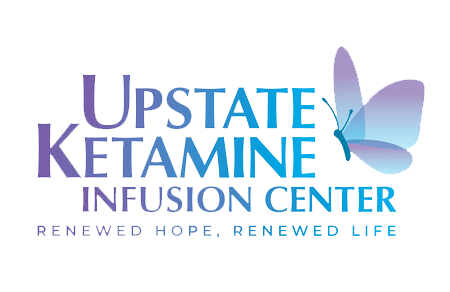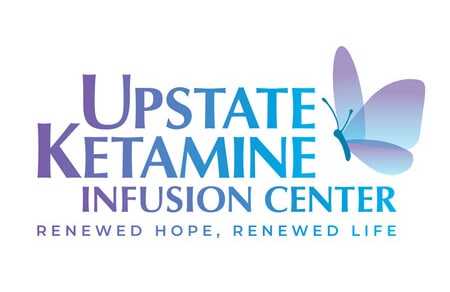Ketamine infusion therapy
Ketamine is an FDA- approved anesthetic that has been in use for well over 50 years. Science Magazine reports, “it’s the biggest breakthrough in depression research in a half of a century”. Many people lose some important functioning components in their brain called synapses that let nerve cells communicate. As quick as 24 hours following a medically supervised Ketamine infusion those pathways can begin to regenerate. Yale Medicine Chief Psychiatrist reports, “This is a game changer, with most medicines like Valium, the anti-anxiety effect you get only last when it is in your system. When the valium goes away, you can get rebound anxiety. When you take Ketamine, it triggers a reaction in your cortex that enables brain connections to regrow. It’s the reaction to ketamine not the presence of ketamine in the body that constitutes its effects.

Why choose a ketamine infusion?
Benefits
IV ketamine therapy is a cutting-edge treatment option for patients with severe or complicated psychiatric disorders and chronic pain. It has a strong safety profile with transient side effects, meaning they only last while the infusion is in progress and subside once the treatment is completed. Over 70% of patients experience an improvement in their function and mood soon after beginning treatment. Similar success rates have been seen in returning combat veterans suffering from PTSD. For a patient that responds to ketamine infusion therapy, some may see therapeutic results as soon as after one to three infusions. IV ketamine has shown to reduce depressive symptoms such as suicidality rapidly. Chronic pain symptoms have been relieved and often opioid medication needs have been lowered as well. Clinical trials have shown promising results in the management of treatment-resistant depression, PTSD (post-traumatic stress disorder), chronic pain, fibromyalgia, headaches, OCD (obsessive compulsive disorder), substance abuse, suicidal ideations and more. We will work with you and your mental health team as well as your medical providers to see if Ketamine infusions are an option for you. If you no longer have a team of providers, we are also here to guide you through the process. Ketamine’s ability to relieve the symptoms of depression and chronic pain is truly amazing and has been proven to be fast and effective.
“…studies have found that ketamine can do something no other drug can: it often relieves even suicidal depression
in a matter of hours in patients who have not responded to other treatments.”
– NPR.org (March 20, 2017)
Ketamine treatment has shown an “ability to produce rapid and robust antidepressant effects in patients with
mood and anxiety disorders that were previously resistant to treatment”.
– Gerard Sanacora MD, PhD et al.,
JAMA Psychiatry (April 2017)
What To Expect?
Once you have contacted the office and it has been determined that you are a candidate for IV Ketamine infusion therapy you will arrive at your first scheduled appointment. You will complete the necessary intake forms. You will be placed in a private room in a comfy recliner. You will be connected to our monitoring device and we will place a small size IV catheter in your arm. Your infusion will last approximately 40 min (longer if 2 hr chronic pain option chosen).You may bring a blanket or other items that might make you more comfortable during your treatment. You are encouraged to bring your own headphones and a playlist of instrumental music. An eye mask and ear plugs are provided if needed. Once your infusion is complete you will be given time to recover. Once it is determined that you are safe to ambulate, you are free to leave. A driver is required. You are free to bring a loved one who can stay in the room with you during the treatment or they can drop you off and pick you up. We ask that you refrain from eating 4 hours prior to your appointment and stop drinking 2 hours prior to the treatment. Initial Ketamine therapy consists of 6 treatments given over a 2–3-week period, usually every other day or every 2-3 days. If you are unable to make it to your scheduled appointment, we ask that you contact the office as soon as possible. There may be someone who desperately needs that appointment, as these can be life-saving treatments for some individuals. We look forward to seeing you soon!
References:
Suprio Mandal, Vinod Kumar Sinha, And Nishant Goyal. Efficacy of Ketamine therapy in the treatment of depression, Indian Journal Of Psychiatry. 2019 Sept-Oct; 61(5): 480-485.
Doi:10.4103/psychiatry.IndianJPsychiatry_484_18
Thakurta RG, Das R, Bhattacharya AK, Saha D, Sen S, Sing OP, et al. Rapid Response with Ketamine on suicidal cognitions in resistant depression. Indian J Psychol Med. 2012;34:170-5. [Google Scholar]
Office of Quality and Performance and the Veterans Affairs and Department of Defense Development Work Group. Clinical Practice Guideline for the Management of Posttraumatic Stress Disorder and Acute Stress Disorder. Version 3.0.Washington, DC: Veterans Health Administration and Department of Defense; 2017. [Google Scholar]
Feder A, Parides MK, Murrough JW, et al. Efficacy of intravenous ketamine for treatment of chronic posttraumatic stress disorder. JAMA Psychiatry. 2014;71(6):681–688. doi: 10.1001/jamapsychiatry.2014.62. [PubMed] [CrossRef] [Google Scholar]
Womble AL. Effects of ketamine on major depressive disorder in a patient with posttraumatic stress disorder. AANA J. 2013;81(2):118–119. [PubMed] [Google Scholar]
Hanna AF and Smith AJ. Intravenous Ketamine Produces Long-Term Pain Relief in a Patient with Fibromyalgia. Case Report: Fibromyalgia open access 2016, Vol 1(1): 104
Cohen, S. P., Bhatia, A., Buvanendran, A., Schwenk, E. S., Wasan, A. D., Hurley, R. W., Viscusi, E. R., Narouze, S., Davis, F. N., Ritchie, E. C., Lubenow, T. R., & Hooten, W. M. (2018). Consensus Guidelines on the Use of Intravenous Ketamine Infusions for Chronic Pain From the American Society of Regional Anesthesia and Pain Medicine, the American Academy of Pain Medicine, and the American Society of Anesthesiologists. Regional anesthesia and pain medicine, 43(5), 521–546. https://doi.org/10.1097/AAP.0000000000000808
Jones, J. L., Mateus, C. F., Malcolm, R. J., Brady, K. T., & Back, S. E. (2018). Efficacy of Ketamine in the Treatment of Substance Use Disorders: A Systematic Review. Frontiers in psychiatry, 9, 277. https://doi.org/10.3389/fpsyt.2018.00277
Duman RS and Aghajanian GK. Synaptic Dysfunction in Depression: Potential Therapeutic Targets. Science 05 Oct 2012: Vol. 338, Issue 6103, pp. 68-72
DOI: 10.1126/science.1222939
John Krystal, MD. Yale Medicine News. March 9, 2022.
Effects of ketamine in treatment-refractory obsessive-compulsive disorder. Biol Psychiatry 72: 964–970. [PMC free article] [PubMed] [Google Scholar]
Silote, Gabriela P. de Oliveira, Sabrina F.S. Ribeiro, Deidiane E. Machado, Mayara S. Andreatini, Roberto Joca, Sâmia R.L. and Beijamini, Vanessa 2020. Ketamine effects on anxiety and fear-related behaviors: Current literature evidence and new findings. Progress in Neuro-Psychopharmacology and Biological Psychiatry, Vol. 100, Issue. , p. 109878.


